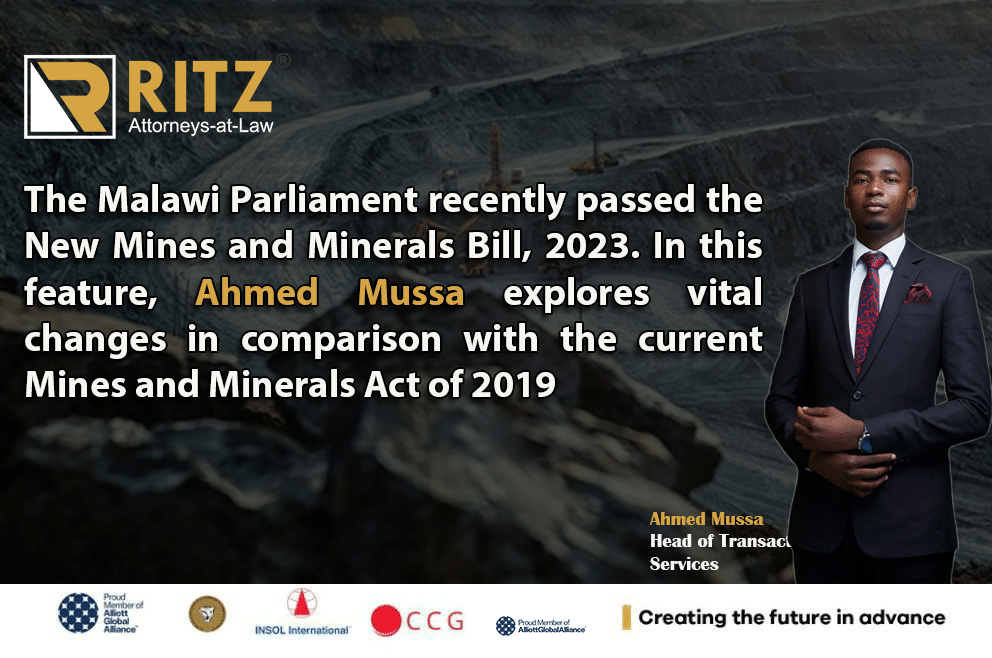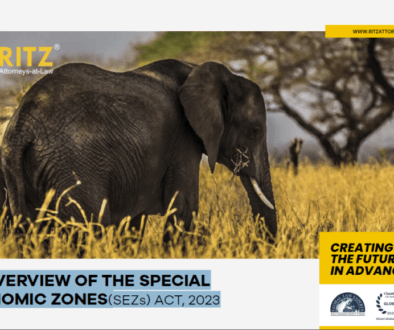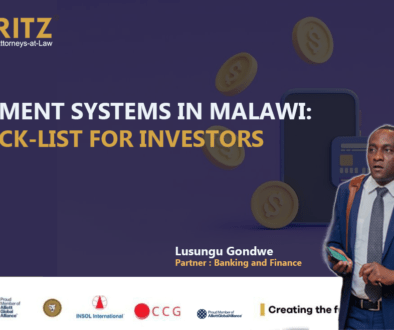- Introduction
On Thursday, April 13, 2023, Parliament passed the Mines and Minerals Bill, 2023 [the Bill] that repeals the Mines and Minerals Act, of 2019 [the Act]. The Bill has significantly changed the landscape of the mining sector. This commentary discusses the key changes and improvements made under the Bill compared to the 2019 Act and how the same will benefit and affect stakeholders in the mining sector. In addition, the commentary outlines some shortfalls and recommendations.
- Establishment of a Mining and Mineral Regulatory Authority
The Bill establishes an independent Mining and Mineral Regulatory Authority [Regulatory Authority] responsible for regulating mineral resources and mining activities in Malawi. The Regulatory Authority shall be responsible for granting mining licenses; inspecting mining activities; advising the minister on policy matters of the mining sector; and generally, implementing the objectives of this Bill, among others. Under the 2019 Act, these powers were vested in the Minister upon the recommendation of the Mineral Resources Committee [which has been dissolved]. The Bill has also dissolved the Public Service positions designated as the Commissioner for Mines and Minerals [the Commissioner] and the Director for Geological Surveys and their respective duties have been allocated to the Regulatory Authority as well.
This is in line with His Excellency Dr. Lazarus McCarthy Chakwera’s [the President] second National Address on the Government’s policy on the mining sector delivered on Sunday, May 2, 2021, from 2000 hours. The President expressed a shared concern about unregulated mining that has been conducted in Malawi for the sole benefit of exploitative external traders at the expense of ordinary Malawians. To curb this unfortunate reality, the President proposed the establishment of a Regulatory Authority with the mandate of overseeing the activities of the mining sector.
- Registration of Mineral Tenements
The Bill has tasked the Regulatory Authority to keep and maintain the register of every application for a mineral tenement, every mineral tenement granted, and of any dealings with, or affecting a mineral tenement. Under the 2019 Act, this duty was vested in the now-dissolved Commissioner. The Bill has maintained the same series of files and information that appeared in the Register of Commissioners. Additionally, the Bill has added a further series namely a register of cooperative mining societies and mining partnerships, which the Regulatory Authority, must now keep in its register.
- Extra Requirements on Environmental Matters
Under the Bill, the Authority shall not grant a license with respect to a project for which an environmental and social impact assessment is required under the Environment Management Act unless the Malawi Environment Protection Authority has certified in writing that the project has been approved by the Minister responsible for environmental matters or that an environmental and social impact assessment is not required under the Environment Management Act. In contrast to the 2019 Act, the Bill has replaced the certifying body from the Director of Environmental Affairs [under the Act] to the Malawi Environment Protection Authority with an extra requirement of approval of the Minister.
- Term for Exploration Licence
Under the Bill, the term for exploration licenses has been increased to 5 years which may be extended to 3 years. Under the Act, the term was only for 3 years and would only be extended for 3 years only.
- Offense to Refuse Assistance or Obstruct Authorised Officer
The custodial penalty for a person who obstructs an authorized officer of the Regulatory Authority from conducting his duties has been increased to 4 years IHL as compared to the 2 years under the Act. However, the monetary penalty is maintained at MK10, 000, 000.00.
- Offense Relating to Annual Ground Rent and Mineral Royalty
The monetary penalty for a person who evades or assists someone to evade payment of annual ground rent and mineral royalty has been reduced under the Bill to MK10, 000, 000.00 as compared to the MK20, 000, 000.00 under the Act. The other punitive and custodial penalties have been maintained.
- Government Ownership Interest
Under the Act, the Government of Malawi [the Government] had a right to free equity ownership up to 10% in mining activities. Under the Bill, the Government maintains such a right but has removed the 10% ceiling that was provided under the Act. What this means is that government has the discretion to either reduce or increase the percentage as circumstances would permit. However, as provided in the 2019 Act, under the Bill as well, the Government may elect to exercise this right or not.
- Implementation
The Bill is a very good starting point in our quest of bringing sanity and turning around the fortunes of the mining sector. Implementation of this Bill requires greater coordination and alignment of policy objectives between various agencies and ministries with the established Regulatory Authority. Coordination is crucial in enabling a seamless flow of information between government ministries and the Regulatory Authority, thereby avoiding regulatory overlap.
Shortfalls
The Bill is still lacking in certain crucial elements as discussed below:
- No Establishment of a National Mining Company
The Bill has not considered and/or recommended the establishment of a National Mining Company [NMC] to develop the mining sector by catalyzing private sector investment, holding equity interests in minerals extraction, conduct beneficiation and minerals value addition activities among other important roles.
NMCs are not a new phenomenon in the African mining sector. There are notable examples such as Tanzania’s State Mining Corporation (STAMICO); South Africa’s African Exploration Mining and Finance Corporation (AEMFC); and Kenya’s National Mining Corporation just to mention a few. NMCs ensure the maximization of profits from the mining industry by conducting beneficiation and/or value addition to minerals [so that they can be exported with a higher value than raw minerals] and competing with International Mining Companies in participating in the mining sector. As a country, we need an NMC formulated and operating independently [with little or no interference from the Government] and in line with international best practices for it to succeed.
- Mining Infrastructure and Expertise Acquisition
Appropriate and adequate mining infrastructure is of utmost importance to the creation of the right investment climate to attract foreign investors into the Malawian mining sector. Such infrastructure includes physical infrastructure such as motorable access roads, refineries, and processing plants for the beneficiation and/or value addition of minerals. It also includes associated infrastructure such as adequate electricity supply, water supply, telecommunications systems, information technology systems, and port agencies among others. The associated infrastructure complements and provides secondary support for the extraction and processing of minerals.
The Bill does not adequately address the current mining sector infrastructure gaps to revamp the mining sector. The Bill should have explored the possibility of engaging mining companies to jointly develop and finance shared infrastructure systems. By doing so, the government can leverage the mining infrastructure gaps.
Further, there is a constant need for fiscal incentives that will accentuate the said shared and integrated infrastructure by mining companies. Fiscal incentives will allow mining companies to recover their costs and further realize a profit from mining activities. It will be imperative to have such projects as a critical indicator of local content requirements as well as incorporate them as conditions for the award of mining licenses. The Bill is lacking in that sense and I strongly recommend a further amendment for the Bill to effectively address its intended purpose.





April 19, 2023 @ 8:54 am
Counsel,
How do u look at the issue of how mining and extraction contracts ought to be negotiated so as to ensure that Mw Govt and it’s people do benefit other than appear to be losing alot? Is that perhaps assumed to be covered under the Gvt Ownership Interest Clauses?
April 19, 2023 @ 9:12 am
My humble view is that over and above the government ownership interest clauses, the mining and extraction contracts should explore more local content requirements such as value addition (beneficiation) of minerals, local supply of labour and resources, and infrastructure development as part of the said contracts. In that way, we would enhance our benefits from mining activities as a country.
April 21, 2023 @ 9:44 am
A very comprehensive commentary on the new Mining Act. Quite educational i must say.
April 30, 2023 @ 8:55 pm
We still have a long way to go but nice start, I hope this article’s reviews will be taken into consideration.